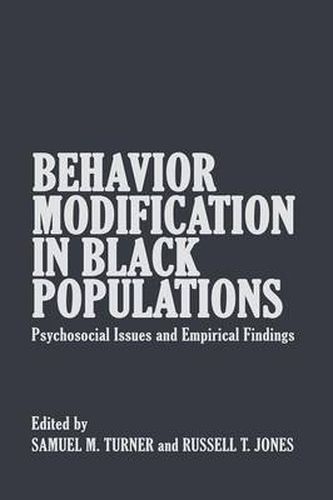Readings Newsletter
Become a Readings Member to make your shopping experience even easier.
Sign in or sign up for free!
You’re not far away from qualifying for FREE standard shipping within Australia
You’ve qualified for FREE standard shipping within Australia
The cart is loading…






This title is printed to order. This book may have been self-published. If so, we cannot guarantee the quality of the content. In the main most books will have gone through the editing process however some may not. We therefore suggest that you be aware of this before ordering this book. If in doubt check either the author or publisher’s details as we are unable to accept any returns unless they are faulty. Please contact us if you have any questions.
During the past decade, research and practice in the field of behavior modification have experienced phenomenal growth. Behavioral inter vention strategies that were considered strictly experimental a few years ago are now accepted therapeutic modalities, and behavioral method ology has been instrumental in creating an atmosphere conducive to the development of scientific rigor in the area of mental health. But behav ioral influence has not been limited to mental health. There has been considerable impact in education, industry, government, and general health care. Although behavior modification has made a significant impact on psychology in general, there has been a noticeable lack of theorizing and empirical research on issues primarily related to black populations. In fact, the black community in general, and black psychologists in partic ular, often have viewed behavioral approaches with suspicion. We hope that the material presented in this volume will serve to clarify what the behavioral approach is and what it is not and that it will help to foster an understanding of the behavioral approach. Moreover, empirical data demonstrating the effectiveness of behavioral procedures with black populations are presented. It is our hope that the material will provide some insight into how behavioral theory, methodology, and therapeutic strategies can be used to the benefit of black mental health in particular and the overall psychological health of the black community in general.
$9.00 standard shipping within Australia
FREE standard shipping within Australia for orders over $100.00
Express & International shipping calculated at checkout
This title is printed to order. This book may have been self-published. If so, we cannot guarantee the quality of the content. In the main most books will have gone through the editing process however some may not. We therefore suggest that you be aware of this before ordering this book. If in doubt check either the author or publisher’s details as we are unable to accept any returns unless they are faulty. Please contact us if you have any questions.
During the past decade, research and practice in the field of behavior modification have experienced phenomenal growth. Behavioral inter vention strategies that were considered strictly experimental a few years ago are now accepted therapeutic modalities, and behavioral method ology has been instrumental in creating an atmosphere conducive to the development of scientific rigor in the area of mental health. But behav ioral influence has not been limited to mental health. There has been considerable impact in education, industry, government, and general health care. Although behavior modification has made a significant impact on psychology in general, there has been a noticeable lack of theorizing and empirical research on issues primarily related to black populations. In fact, the black community in general, and black psychologists in partic ular, often have viewed behavioral approaches with suspicion. We hope that the material presented in this volume will serve to clarify what the behavioral approach is and what it is not and that it will help to foster an understanding of the behavioral approach. Moreover, empirical data demonstrating the effectiveness of behavioral procedures with black populations are presented. It is our hope that the material will provide some insight into how behavioral theory, methodology, and therapeutic strategies can be used to the benefit of black mental health in particular and the overall psychological health of the black community in general.